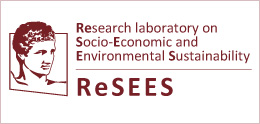Climate Change, Land-Use, and Biodiversity: Economic Perspectives - EAERE
Third the AI digital infrastructure that collects, aggregates and makes available the needed data, models and tools for open access mode of operation for all stakeholders.
More specifically with regards to the nexus between Climate Change, Land-use systems and Biodiversity, Prof. Koundouri has referred the work in collaboration with FABLE and as a case study example she presented the results from the FABLE Scenathon for Greece.
Read the report
For further information on the SDSN Global Climate Hub you can read Prof. Phoebe Koundouri's interview in Springer Nature Group Sustainability.
For further information on the SDSN Global Climate Hub you can read Prof. Phoebe Koundouri's interview in Springer Nature Group Sustainability.
Chair: Simone Borghesi EAERE President, European University Institute and University of Siena
Speakers: Ben Groom, University of Exeter and Dragon Capital Chair in Biodiversity Economics Gianni Guastella, Università Cattolica del Sacro Cuore & Deloitte Italy
Phoebe Koundouri, Athens University of Economics and Business, Denmark Technical University
Ruslana Rachel Palatnik, The Max Stern Yezreel Valley College and NRERC- Natural Resource and Environmental Research Center, University of Haifa.




 76 Patission Str.
76 Patission Str. 30 2108203 455
30 2108203 455

On Tuesday July 2, took place the WCEREA Policy Session on "Climate Change, Land-Use, and Biodiversity: Economic Perspectives" at EAERE2024-29th Annual Conference (Leuven, Belgium)- organized by the World Council of Environmental and Resource Economists Association (of which Professor Phoebe Kountouri is the chairperson), in collaboration with the other world associations of environmental and resource economists - Asian Association of Environmental and Resource Economics (AAERE), AERE, AFAERE, LAERE, AARES). Τhe session provided a global view on what makes climate, biodiversity and land use policy most effective, for as many as possible, and for as long as possible.
The panel discussion focused on crucial strategies for long-term biodiversity and land use policies aligned with climate action. Professor Koundouri during her speech, presented the methodological framework of SDSN Global Climate Hub, which consist of three layers of analysis:
First, the Science layer that develops national dynamic pathways for the transition to Climate Neutrality and Resilience, by integrating systems analysis of climate, energy, transport, land-use, marine-use, health and socioeconomic mathematical models.
Second, the Transformative Stakeholder Engagement methods for empowering stakeholders to co-design and localise the science driven pathways.